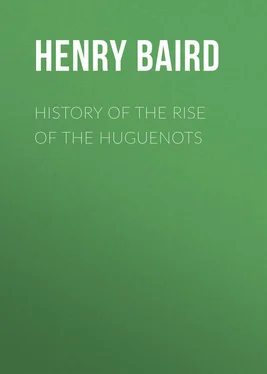Henry Baird - History of the Rise of the Huguenots
Здесь есть возможность читать онлайн «Henry Baird - History of the Rise of the Huguenots» — ознакомительный отрывок электронной книги совершенно бесплатно, а после прочтения отрывка купить полную версию. В некоторых случаях можно слушать аудио, скачать через торрент в формате fb2 и присутствует краткое содержание. ISBN: , Жанр: foreign_antique, foreign_prose, на английском языке. Описание произведения, (предисловие) а так же отзывы посетителей доступны на портале библиотеки ЛибКат.
- Название:History of the Rise of the Huguenots
- Автор:
- Жанр:
- Год:неизвестен
- ISBN:http://www.gutenberg.org/ebooks/30708
- Рейтинг книги:4 / 5. Голосов: 1
-
Избранное:Добавить в избранное
- Отзывы:
-
Ваша оценка:
- 80
- 1
- 2
- 3
- 4
- 5
History of the Rise of the Huguenots: краткое содержание, описание и аннотация
Предлагаем к чтению аннотацию, описание, краткое содержание или предисловие (зависит от того, что написал сам автор книги «History of the Rise of the Huguenots»). Если вы не нашли необходимую информацию о книге — напишите в комментариях, мы постараемся отыскать её.
History of the Rise of the Huguenots — читать онлайн ознакомительный отрывок
Ниже представлен текст книги, разбитый по страницам. Система сохранения места последней прочитанной страницы, позволяет с удобством читать онлайн бесплатно книгу «History of the Rise of the Huguenots», без необходимости каждый раз заново искать на чём Вы остановились. Поставьте закладку, и сможете в любой момент перейти на страницу, на которой закончили чтение.
Интервал:
Закладка:
The fact is that Guise was only witnessing the fruits of his instructions, enforced by his own example. He had given the first taste of blood, and now, perhaps without his actual command, the pack had taken the scent and hunted down the game. He was avowedly on a crusade to re-establish the supremacy of the Roman Catholic religion throughout France. If he had not hesitated to hang a poor pin-dealer for allowing his child to be baptized according to the forms of Calvin's liturgy; if he was on his way to Paris to restore the Edict of July by force of arms, it is idle to inquire whether he or his soldiers were responsible for the blood shed in peace. "He that sowed the seed is the author of the harvest."
Condé appeals to the king.
The news quickly flew to Condé that the arch-enemy of the Protestants had begun the execution of the cruel projects he had so long been devising with his fanatical associates; that Guise was on his way toward seditious Paris, with hands yet dripping with the blood of the inhabitants of a quiet Champagnese town, surprised and murdered while engaged in the worship of their God. Indignant, and taking in the full measure of the responsibility imposed upon him as the most powerful member of the Protestant communion, the prince, who was with the court at the castle of Monceaux – built for herself by Catharine in a style of regal magnificence – laid before the king and his mother a full account of the tragic occurrence. It was a pernicious example, he argued, and should be punished promptly and severely. Above all, the perpetrators ought not to be permitted to endanger the quiet of France by entering the capital. Catharine was alarmed and embarrassed by the intelligence; but, her fear of a conjunction between Guise and Navarre overcoming her reluctance to affront the Lorraine family, induced her to consent; and she wrote to the Duke, who had by this time reached his castle of Nanteuil, forbidding him to go to Paris, but inviting him to visit the court with a small escort. At the same time she gave orders to Saint André to repair at once to Lyons, of which he was the royal governor. But neither of the triumvirs showed any readiness to obey her orders. The duke curtly replied that he was too busy entertaining his friends to come to the king; the marshal promptly refused to leave the king while he was threatened by such perils. 42 42 Jean de Serres, ii. 17, 18; De Thou, iii. 132, 133.
Beza's remonstrance.
An anvil that has worn out many hammers.
The King of Navarre now came from Paris to Monceaux, to guard the interests of the party he had espoused. He was closely followed by Theodore Beza and Francour, whom the Protestants of Paris had deputed, the former on behalf of the church, the latter of the nobility, to demand of the king the punishment of the authors of the massacre. The queen mother, as was her wont, gave a gracious audience, and promised that an investigation should be made. But Navarre, being present, seemed eager to display a neophyte's zeal, and retorted by blaming the Huguenots for going in arms to their places of worship. "True," said Beza, "but arms in the hands of the wise are instruments of peace, and the massacre of Vassy has shown the necessity under which the Protestants were laid." When Navarre exclaimed: "Whoever touches my brother of Guise with the tip of his finger, touches my whole body!" the reformer reminded him, as one whom Antoine had himself brought to France, that the way of justice is God's way, and that kings owe justice to their subjects. Finally, when he discovered, by Navarre's adoption of all the impotent excuses of Guise, that the former had sold himself to the enemies of the Gospel, Theodore Beza made that noble reply which has become classic as the motto of the French Reformation: "Sire, it is, in truth, the lot of the Church of God, in whose name I am speaking, to endure blows and not to strike them. But also may it please you to remember that it is an anvil that has worn out many hammers. " 43 43 "Sire, c'est à la vérité à l'Église de Dieu, au nom de laquelle je parle, d'endurer les coups, et non pas d'en donner. Mais aussi vous plaira-t-il vous souvenir que c'est une enclume qui a usé beaucoup de marteaux ." Hist. ecclés. des égl. réf., ii. 1, 2; Pierre de Lestoile, Journal de Henri III. (ed. Petitot), i. 55; De Thou, iii. 132, 133.
Guise's entry into Paris.
At Nanteuil, Guise had been visited by the constable, with two of his sons, by Saint André, and by other prominent leaders. Accompanied by them, he now took the decided step of going to Paris in spite of Catharine's prohibition. His entry resembled a triumphal procession. 44 44 Journal de Jehan de la Fosse, 45, 46; Santa Croce to Borromeo, Aymon, i. 96, 97; Jean de Serres, ii. 18; Chantonnay, ubi supra , ii. 27; Hist, ecclés. des égl. réf., ii. 2, 3; Throkmorton to the Queen, March 20th, State Paper Office; De Thou, iii. 133; etc. The date was the 15th of March, according to La Fosse; the 16th, according to Languet (ii. 212) and Throkmorton; the 18th, according to Santa Croce; the 20th, according to J. de Serres. I prefer to all the authority of a letter of one Chastaigner, written from Paris to a friend in Poitou on the very day of Guise's entry. It is dated March 17th. "Quant aux nouvelles de Monsieur de Guyse, il est arrivé ce soir en ceste ville, Monsieur le connestable et Monsieur le maréchal de Saint-André avec luy, et en tout avoient bien deux mil chevaulx, les ungs disent plus." (Archives of Poitiers, and printed in Bulletin, xiii. (1864), 15, 16.)
In the midst of an escort estimated by eye-witnesses at two thousand horse, Francis of Guise avoided the more direct gate of St. Martin, and took that of St. Denis, through which the kings of France were accustomed to pass. Vast crowds turned out to meet him, and the cries of " Vive Monsieur de Guise! " sounding much like regal acclammations, were uttered without rebuke on all sides. The "prévost des marchands" and other members of the municipal government received him with great demonstrations of joy, as the defender of the faith. At the same hour the Prince of Condé, surrounded by a large number of Protestant noblemen, students, and citizens, was riding to one of the preaching-places. 45 45 This was not by accident. It had been planned by Condé, to show that the Huguenots were brave and determined, and it succeeded so well that it not only made an impression on the party of Guise, but also largely augmented the courage of his own men. Letter of Beza to Calvin, March 22, 1562, apud Baum, ii., App., 171. Condé had returned to Paris by the urgent request of the Protestants. Jean de Serres, ii. 19.
The two cavalcades met, but no collision ensued. The Huguenot and the papist courteously saluted each other, and then rode on. It is even reported that between the leaders themselves less sincere amenities were interchanged. Guise sent word to Condé that he and his company, whom he had assembled only on account of the malevolent, were at the prince's commands. Condé answered by saying that his own men were armed only to prevent the populace of Paris from making an attack upon the Protestants as they went to their place of worship. 46 46 Letter of Chastaigner, ubi supra .
Anxieties of Catharine de' Medici.
For weeks the position of the queen mother had been one of peculiar difficulty and anxiety. That she was "well inclined to advance the true religion," and "well affected for a general reformation in the Church," as Admiral Coligny at this time firmly believed, 47 47 Throkmorton to the queen, March 6th, State Paper Office.
is simply incredible. But, on the other hand, there can be little doubt that Catharine saw her interest in upholding the Huguenot party, of which Condé and the three Châtillon brothers were acknowledged leaders. Unfortunately, the King of Navarre, "hoping to compound with the King of Spain for his kingdom of Navarre," had become the tool of the opposite side – he was " all Spanish now " 48 48 "The King of Navarre was never so earnest on the Protestant side as he is now furious on the papists' part, insomuch as men suspect he will become a persecutor." Throkmorton to Cecil, March 9th, State Paper Office. Summary in Calendar.
– and Chantonnay, Philip's ambassador, was emboldened to make arrogant demands. The envoy declared that, "unless the house of Châtillon left the court, he was ordered to depart from France." Grave diplomatists shook their heads, and thought the menace very strange, "the rather that another prince should appoint what counsellors should remain at court;" and sage men inferred that "to such princes as are afraid of shadows the King of Spain will enterprise far enough." 49 49 Throkmorton to the queen, March 6, 1562, State Paper Office.
None the less was Catharine deeply disturbed. She felt distrust of the heads of the Roman Catholic party, but she feared to break entirely with them, and was forced to request the Protestant leaders to withdraw for a time from the vicinity of Paris. That city itself presented to the eye a sufficiently strange and alarming aspect, "resembling more a frontier town or a place besieged than a court, a merchant city, or university." Both sides were apprehensive of some sudden commotion, and the Protestant scholars, in great numbers, marched daily in arms to the "sermons," in spite of the opposition of the rector and his council. 50 50 The same to Cecil, same date, State Paper Office.
The capital was unquestionably no place for Catharine and her son, at the present moment.
Интервал:
Закладка:
Похожие книги на «History of the Rise of the Huguenots»
Представляем Вашему вниманию похожие книги на «History of the Rise of the Huguenots» списком для выбора. Мы отобрали схожую по названию и смыслу литературу в надежде предоставить читателям больше вариантов отыскать новые, интересные, ещё непрочитанные произведения.
Обсуждение, отзывы о книге «History of the Rise of the Huguenots» и просто собственные мнения читателей. Оставьте ваши комментарии, напишите, что Вы думаете о произведении, его смысле или главных героях. Укажите что конкретно понравилось, а что нет, и почему Вы так считаете.












